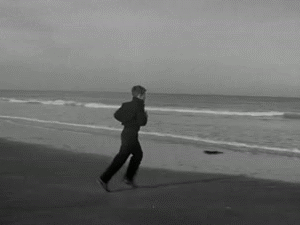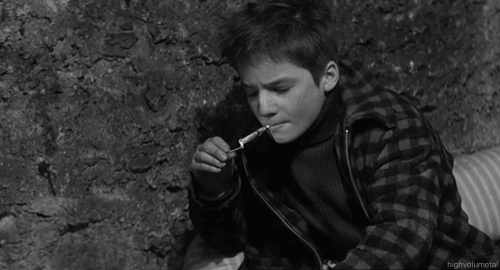#basique
Text
Les prépositions
A
À - to (je vais à la plage - I’m going to the beach), at (le chat est à la maison - the cat is at the house), indirect object/complément d’attribution (c’est au chat - it’s the cat's), adverbial phrase of way (une peinture à l’huile - an oil painting), adverbial locution introducer (à l’instant - just now), price indicator (le kilo de pommes est à deux euros), infinitive form introducer (c’est à prendre ou à laisser - take it or leave it), approximation introducer (c’est à dix minutes d’ici - it’s about ten min. away), against (dos à dos), after (pas à pas), until (aimer à la folie)
Après - after (je te rejoins après le travail - I’ll join you after work)
Avant - before (je me suis levée avant toi - I got up before you did)
Avec - with (je vis avec mes deux chats - I live with my two cats)
C
Chez - at X’s > person or brand of a shop (je suis chez mon père - I'm at dad's)
Concernant - regarding, about (concernant ton offre, je la refuse - about your offer, I'm refusing it)
Contre - against (je suis contre ta décision - I stand against your decision, le chat est assis contre le mur - the cat is sitting against the wall)
D
Dans - in (le chat est dans mon sac - the cat is in my bag)
D’après - according to (d’après Victor Hugo, Fantine est blonde)
De - of (au bout de la rue - at the end of the street)
Dedans - inside of it (le chat est dedans - the cat is inside of it)
Dehors - outside (le chat est dehors - the cat is outside)
Depuis - since (j'ai mon chat depuis que j'ai dix ans - I've had my cat since I was 10), from (tout était beau, depuis la décoration jusqu’aux couleurs - everything was lovely, from the decoration to the colours)
Derrière - behind (le chat est derrière toi - the cat is behind you)
Dès - as soon as (je te préviens dès que j’arrive - I’ll let you know as soon as I get there), immediately (si je pouvais, je partirais dès maintenant)
Dessous - under (la clé était dessous le lit - the key was under the bed)
Dessus - on (le chat est assis dessus - the cat is sitting on it),
Devant - in front of (j’attends devant la maison - I’m waiting in front of the house)
Durant - during (il est mort durant la famine - he died during the famine), for (elle a vécu là-bas durant des années - she lived there for years)
E
En - at (je suis nul en Français - I’m bad at French), material indicator (une table en bois - a wooden table), change indicator (il s’est transformé en papillon - it turned into a butterfly), division mood (couper en deux - cut in two pieces), during (en hiver, j’ai toujours un rhume - during the winter season, I always get a cold), gerundive element (elle tomba en criant - she fell, screaming), shape/appearance indicator (un arbre en fleurs - a blossoming tree)
Entre - between/out of (entre tous les garçons, Louis est le plus grand - out of all of the boys, Louis is the tallest)
Envers - towards/to (il est méchant envers elle - he’s mean to her)
Ès - in (licencié-e ès sciences - bachelor of sciences) - rare, uni titles
Excepté(e/s) - except (exceptée Louise, elles sont toutes arrivées)
H
Hormis - except (hormis Pierre, nous avons tous le permis - except from Pierre, we all have a driving license)
Hors - out of (il est hors de lui - he’s beside himself)
J
Jusque/jusqu’à (+ subjunctive) - until (il a miaulé jusqu'à ce que je le nourrisse - he meowed until I fed him)
M
Malgré - despite (il est venu malgré sa grippe - he came despite his flu)
Moyennant - in exchange for (moyennant un changement de ton, tu pourras rester - If you change your tone, you’ll be allowed to stay) - rare
N
Nonobstant - in spite of (”Charles Myriel, nonobstant ce mariage, avait, disait-on, beaucoup fait parler de lui” Les Misérables) - rare/old
O
Ôté - taken of from (6 ôté de 10 égale 4)
Outre - besides (outre mes deux cats, il n'y a personne chez moi - outside of my cats, there's no one at my house)
P
Par - by (la Joconde a été painte par Léonard de Vinci), direction indicator (il est parti par là - he went that way), with (je commence par une entrée - I start with an entree), per (j’en prends trois par jour - I take three per days)
Parmi - amongst (parmi mes chats, c'est le plus petit - he’s my smallest cat)
Passé - after/past (passé 2h, tout est fermé - past 2AM, everything is closed)
Pendant - during (je t’appellerai pendant ma pause - I’ll call you during my break)
Pour - for (je suis là pour toi - I’m here for you), to (je pars pour Paris - I’m heading to Paris), according to (pour moi, c'est une erreur - I think it's a mistake)
Près (de) - near (je suis près de Paris - I’m near Paris)
S
Sans - without (je suis sans voix - I am speechless)
Sauf - except (j’aime tout sauf la pluie - I like everything but rain)
Selon - according to (selon moi, tu as tort - in my opinion, you’re wrong)
Sous - under (le chat est sous la table - the cat is under the table)
Suivant - according to (suivant ce que j’ai entendu, il ne reviendra pas - according to what I’ve heard, he won’t come back)
Sur - on (le chat est sur la table - the cat is on the table), about (c’est un film sur la guerre - it’s a movie about the war), towards (regarde sur ta droite - look on your right), out of (deux fois sur trois il est en retard - two out of three times he's late)
V
Vers - towards (elle avance vers moi - she’s coming towards me), somewhere around (elle habite vers l’église - she lives near the church), about (Elle est rentrée vers minuit - she got home around midnight)
Voici - here is/are (voici mon chat - here’s my cat)
Voilà - there is/are (et voilà les miens - and there are mine), it’s been (voilà deux ans que je ne les avais pas vues - it had been two years since I last saw them)
Vu - given (vu la situation, c’est mieux comme ça - given the circumstances, that’s better that way) - casual

Movie: La Chinoise - Jean-Paul Godard, 1967
474 notes
·
View notes
Text

I needed to draw a bit of cream for my stupid mental health
#doodle#undertale#undertale au#TTT#undertale sans#sans#au#castielsan#creamship#dream x cross#cross!sans#dream!sans#basique#simple#xd#mental health
37 notes
·
View notes
Text

Basique - L'émission - "Ce soir sur Basique : Kylie Minogue 💙
📺 18h sur YouTube / 20h40 sur France2"
5 notes
·
View notes
Text
youtube
1 note
·
View note
Text
"Faut pas faire un enfant avec quelqu'un que tu connais pas bien" et même quand tu le connais bien il peut aussi te la faire à l'envers.
1 note
·
View note
Text






lune nettoie ses brouillons: shalom harlow (c. 1990s-2000s)
#ils sont assez basiques mais c'est vraiment#pour nettoyer mes fichiers#ça fait un bail qu'ils mijotaient là#shalom harlow#shalom harlow avatars#avatars#avatars rpg#400x640#ressources rpg#yael jones
88 notes
·
View notes
Text

day 25
#ultratober#ultrakill#ultrakill virtue#virtue ultrakill#virtue#by the way why do these guys sound like baldwin From baldwins basiques. their beams i mean
34 notes
·
View notes
Text
Bon bah, j'ai fini d'écouter toutes les chansons de La Secte Phonétik (en tout cas je crois que y'en a pas d'autres).
C'était merveilleux, un bijou <3
Et maintenant, go trouver des images presque inexistantes de 2010 pour créér des fanarts ig
#la secte phonétik#ils n'ont même pas une page wiki??!!#c'est quoi ça......#even one of my family members has a wiki page how come they don't :(#si vous avez des photos d'eux ou juste des fun facts sur eux n'hésitez pas à les partager <3#honnêtement même les infos très basiques seront appréciées hein#beggars can't be choosers et là je suis carrément begging
12 notes
·
View notes
Text
me at myself, while mentally reviewing what's in my pantry cause i wanna make myself a sandwich : t'as toujours pas racheté du pain ???!!
#3615 my life#it has been six days since i last ate a piece of bread...........woe is me#actually this is a lie i ate bread for lunch#but like c'est pas une tartine quoi#je voulais me faire un sandwich pour manger qqc de rapide MAIS flavorful#but alas it will be chocapics#(qui sont flavorful aussi mais très mono-flavour alors qu'un sandwich même just basique c'est au moins bi-goût)
6 notes
·
View notes
Text
J'ai acheter le maudit..

#vous pouvez me shame#2 EUROS DE PLUS QU'UNE POP BASIQUE CEST QUOI CTE MERDE AA#une dinguerie#la seule qui rentre pas dans l'option 2 acheter 1 offerte de la fnac#j'ai vriller#arthur#arthur pendragon#kaamelott#kenshi's life
21 notes
·
View notes
Text
Les verbes les plus utilisés
Les auxiliaires
Être - to be (je suis une femme, il est avocat, elles sont plus grande que leur soeur, tu es d'accord avec eux)
Avoir - to have (j'ai trente ans depuis septembre, nous avons deux chiens et un chat, on avait du retard ce matin)
Les verbes communs
Aller - to be about to (je vais manger - I'm about to go eat); to go: à + city or article-free country, au + masc. country/location, à la + fem. location, aux + plural country, en + fem. country or means of transportation (je vais à Paris, à Cuba, au Canada, au café, à la mer, aux Caraïbes, en France, en métro)
Attendre - to wait (j'attends son arrivée - I'm waiting for her arrival); + de: expect from (j'attends des efforts de ta part - I'm expecting you to make efforts)
Avoir l'air - to look/seem: ø + adjective (tu as l'air perdu - you look lost), de + infinitive verb (elle a l'air d'être sûre d'elle - she seems confident)
Chercher - to look for (je cherche le chat - I'm looking for the cat); after aller: to get (je vais chercher mon colis - I'm going to get my package); try to remember (je cherche mes mots - "I'm looking for my words")
Comprendre - to understand (tu as tout compris - you got it)
Connaître - to be aware of (je connais bien Montpellier - I know Montpellier well, est-ce que tu as connu les pogs? - were you around when pogs were popular?)
Croire - to believe: + à (real) + definite article + noun (je crois au destin - I believe in destiny); + en (trust) (je ne crois pas en Dieu - I don't believe in God)
Demander - to ask: + à, ask if: si, ask for: de (j'ai demandé à mon frère de lui demander si elle veut venir - I asked my brother to ask her if she wants to come)
Devenir - to become (tu es devenu un beau jeune homme - you became a handsome young man)
Devoir - to have to, to be supposed to; present must, conditional present should (je dois manger - I have to eat, je devrais manger - I should eat)
Dire - to say to: + à (je le dirai à maman - I will tell mum)
Donner - to give: ø + noun, à + person (je donne une pomme à maman - I give an apple to mum)
Ecouter - to listen (j'écoute la pluie - I'm listening to the rain)
Entendre - to hear (j'ai entendu des bruits - I heard some noises)
Essayer - to try: ø + noun (je vais essayer une crevette - I'll try a shrimp), de + infinitive verb (il essaie de conduire - he's driving to drive)
Être en train de - to be in the process of (je suis en train de manger - I'm eating)
Faire - to make something happen/have someone do something for you (je fais nettoyer la cuisine par mon frère - I have my brother clean the kitchen); to do/make: ø + noun, à + verb (je fais mon lit tous les matins - I make my bed every morning, il fait froid - it's cold, ils font à manger - they're making food)
Faillir - to come close from (j'ai failli tomber - I almost fell)
Falloir - to be necessary to (impersonal verb*): ø + verb (il faut partir maintenant - we need to leave now), que + det/noun or pronoun verb (il fallait que tu rentres avant 19h - you were supposed to come home before 7pm)
Finir - to finish, end: ø + noun, de + infinitive verb (je finis de manger - I'm finishing my meal); to end up: + par + infinitive verb (j'en ai marre d'attendre, je vais finir par partir - I'm tired of waiting, I'm going to end up leaving)
Laisser - to let something happen, willingly or not (j'ai laissé refroidir mon plat - I let my meal cool down/get cold); to leave (je vais te laisser - I'll leave you alone, laisse-moi tranquille - leave me alone)
Mettre - to put on (clothes, music), up, something somewhere, someone in a situation (je mets mon bonnet - I'm putting my hat on), take an amount of time (j'ai mis trois heures pour venir - it took me three hours to come)

Parler - to talk to: + à (je parle à maman - I'm talking to mum); to talk about: + de (je parle de l'école - I'm talking about school)
Partir - to go in order to (je suis partie chercher mon fils - I went to go get my son); to leave: à + specific destination/organized trip (je pars à Londres ce week-end), for + vague destination/trip, maybe forced (nous partons pour le Mexique en juin); exiting a location: de chez + person (je pars de chez moi maintenant - I'm leaving home now)
Passer - to pop by to do something (passe me chercher à la gare - come pick me up at the station, je vais passer voir ma tante - I'm going to go visit my aunt)
Pouvoir - to be able to (je peux être là dans dix minutes - I can be there in 10); be likely to/wish to
Prendre - to take: ø + noun, à + verb (je prends un biscuit - I'm taking a biscuit, il a pris à manger pour ce midi - he packed food for lunch)
Regarder - to watch/look, oserve (regarde ça - look at that)
Rendre - to give back (je te rendrai ta clé demain - I will give you your key back tomorrow); to change state (ça l'a rendu fou - it made him crazy)
Rester - to remain (je reste calme - I'm keeping my cool); + chez + person or + à + definite article + location: to stay (je reste chez ma cousine jusqu'à lundi - I'll stay at my cousin's until monday)
Savoir - to know about/how to: que + det/noun or pronoun + verb (ils savent que tu es là - they know that you are here, je sais jouer de la guitare - I can play guitar)
Sortir - to exit (sors de ma chambre - get out of my room); + de: to just have finished something (je sors de table - I just finished my meal)
Tenir - to take/hold (tiens-moi ça - hold this for me); to hold dear (je tiens à toi - I care about you); to hold oneself/resist (tiens-toi droit - stand straight)
Tomber - to fall (over, down, out)/become (je suis tombée malade - I got sick); + sur: come across (je suis tombé sur ta mère - I ran into your mother)
Trouver - to find, come across, get (something you've been looking for), come up with, have the opinion that (je trouve sa robe jolie - I find her dress pretty)
Venir - to come in order to: + pour + infinitive verb (je suis venu pour aider - I came to help); + de: just did something (je viens de rentrer - I just got home) or from (je viens de Paris - I'm from Paris)
Voir - to see: que + det/noun or pronoun + verb (je vois que tu es déjà levé - I see that you're already up), à + appearence + that det/noun or pronoun + verb (il a vu à ton expression que ça n'allait pas - from your expression he could tell something was wrong)
Vouloir - to want to: ø + infinitive verb (je veux m'en aller - I want to go), partitive + noun (je veux du calme - I want some peace and quiet), que + det/noun or pronoun + verb (je veux que tu t'en ailles - I want you to leave)

Les verbes pronominaux
S'appeler - to be called (je m'appelle Rose - my name is Rose)
S'attendre à - to expect (tu t'attends au pire - you expect the worst)
Se demander - to wonder (ils se demandent où on va - they're wondering where we're going)
Se dépêcher - to hurry (dépêche-toi ! - hurry up!)
Se douter - to be suspicious of (je me doutais que tu serais en retard - I was pretty certain that you would be late)
S'excuser (de) - to apologize (je m'excuse de mon retard - I'm sorry for being late)
Se faire - to have something being done to you; passive form of faire + infinitive (je me suis fait virer par mon chef - I got fired by my boss)
Se lever/se coucher - to get up/go to bed (il se lève à 7h - he gets up at 7)
Se mettre - to start to (mets-toi en pyjama - start putting your pyjamas on)
Se mettre à - to start doing something (je me mets à manger - I'm starting to eat)
Se passer - to happen (qu'est-ce qu'il se passe ? - what's happening?)
Se rendre - to go somewhere (je me rends à la gare - I'm going to the station)
Se rendre compte + de + infinitive or + que + conjugated verb - to realise (tu te rends compte qu'il est encore en retard ? - do you realise he's late again?)
Se retourner - to turn around (Orphée s'est retourné - Orpheus turned around)
Se sentir - to feel a certain way inside (je me sens vide - I feel empty)
Se tourner - to turn toward (il s'est tourné vers sa mère - he turned to his mother)
Se tromper - to make a mistake (je me suis trompé de clé - I got the wrong key)
Se trouver - to find oneself (je me trouve belle aujourd'hui - I find myself pretty today, vous vous trouvez devant le magasin - they are standing in front of the shop)
S'occuper de - to take care of (elle s'occupe de lui - she's taking care of him)
Les verbes modaux
Can - present pouvoir (tu peux partir maintenant - you can leave now)*
Could/May/Might - imperfect pouvoir (tu pourrais partir - you could leave)
Have to - present impersonal verb falloir + infinitive or que + subjunctive (il faut que tu partes - it is necessary that you leave)
Must - present devoir (tu dois partir - you must leave)
Ought to - present conditional impersonal verb falloir + infinitive or que + subjunctive (Il faudrait que tu partes - You ought to leave)
Shall/Will - simple future second verb (tu partiras ce soir - you will leave tonight)
Should - present conditional devoir (tu devrais partir - you should leave)
Would - present conditional second verb(j'aimerais partir - I would like to leave)
*this verb typically means being able to: "I can't speak French" would be translated as "I don't speak French" or "I don't know how to speak French", using pouvoir means you are physically unable to do so ie I can't run because my leg is broken.
While auxiliary verbs are the first half of compound tenses and moods, semi-auxiliary verbs are used with another verb left in the present infinitive form to express an influence of their meaning, tense, mood, or aspect - some are the equivalent of modal verbs, others are simply verbs of perception. When not followed by an infinitive verb, those are not considered semi-auxiliary anymore.
Stative verbs (to be, to remain, to feel) express a state rather than an action. They usually relate to thoughts, emotions, relationships, senses, states of being and measurements and cannot be used as the introduction of a gerund (je rentre en marchant but je suis en marchant*).
Impersonal verbs can only be conjugated in the masculine form of the third person singular: il doesn't refer to a person (il pleut - it's raining).

Movie: Les 400 coups - François Truffaut, 1959
304 notes
·
View notes
Text
Merlin dans sa vie, il a forcément eu un animal de compagnie qu'il a appelé Châtaigne, c'est obligé.
Ça vaut bien une fic ❤
Châtaigne ou l'espérance
#kaamelott#merlin#Chataigne parce que il etait marron et que Merlin il a pas beaucoup d'imagination#et aussi ca lui permet d'associer deux choses qu'il adore#Au debut j'avais pensé a un truc basique genre un chien ou un loup#mais plus j'y pense et plus je vois un ours#Ah ca y est j'ai une idée bien Angst
33 notes
·
View notes
Photo


Kaamelott, Livre I, L'escorte
#the beauty of kaamelott................... basiquement chaque frame d'alexis henon#kaamelott#alexis henon#galessin#KT L01E88#série
46 notes
·
View notes
Text
youtube
#chimie#acide#base#potentiel#hydrogène#proton#solution#aqueuse#neutre#basique#alcalinité#concentration#mesure#négatif#sol#Youtube
0 notes
Text
après des années dans des cursus universitaires de gauchos et tumblr, c'est dingue comment j'oublie que certaines choses sont pas du touuuuut la norme
rien qu'aujourd'hui j'ai dû expliquer à ma responsable ce que voulait dire cisgenre et réécrire un panneau où mon collègue avait marqué "journée de la femme"
#et c'est des gens de gauche#mais de gauche classique quoi donc ils y connaissent rien à ces trucs là#quand j'ai repris mon collègue en disant que c'était la journée des droits des femmes il était juste en mode 'ah ok'#sur le coup j'ai même pas su expliquer pk c'était important parce que pour moi c'est tellement basique#mais ni lui ni elle était antagonizing ou quoique ce soit#juste c'est des problématiques éloignées d'eux quoi#lise raconte sa vie
10 notes
·
View notes